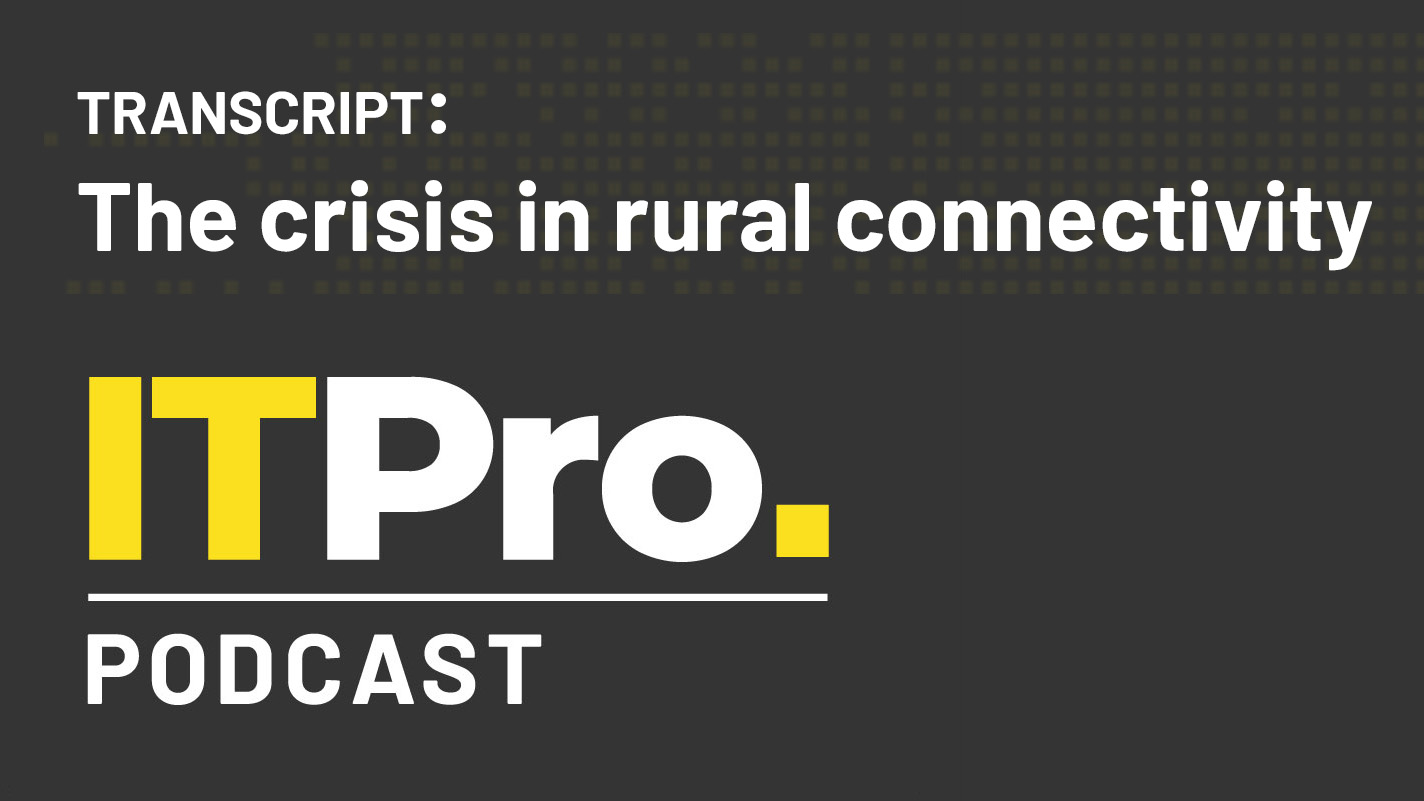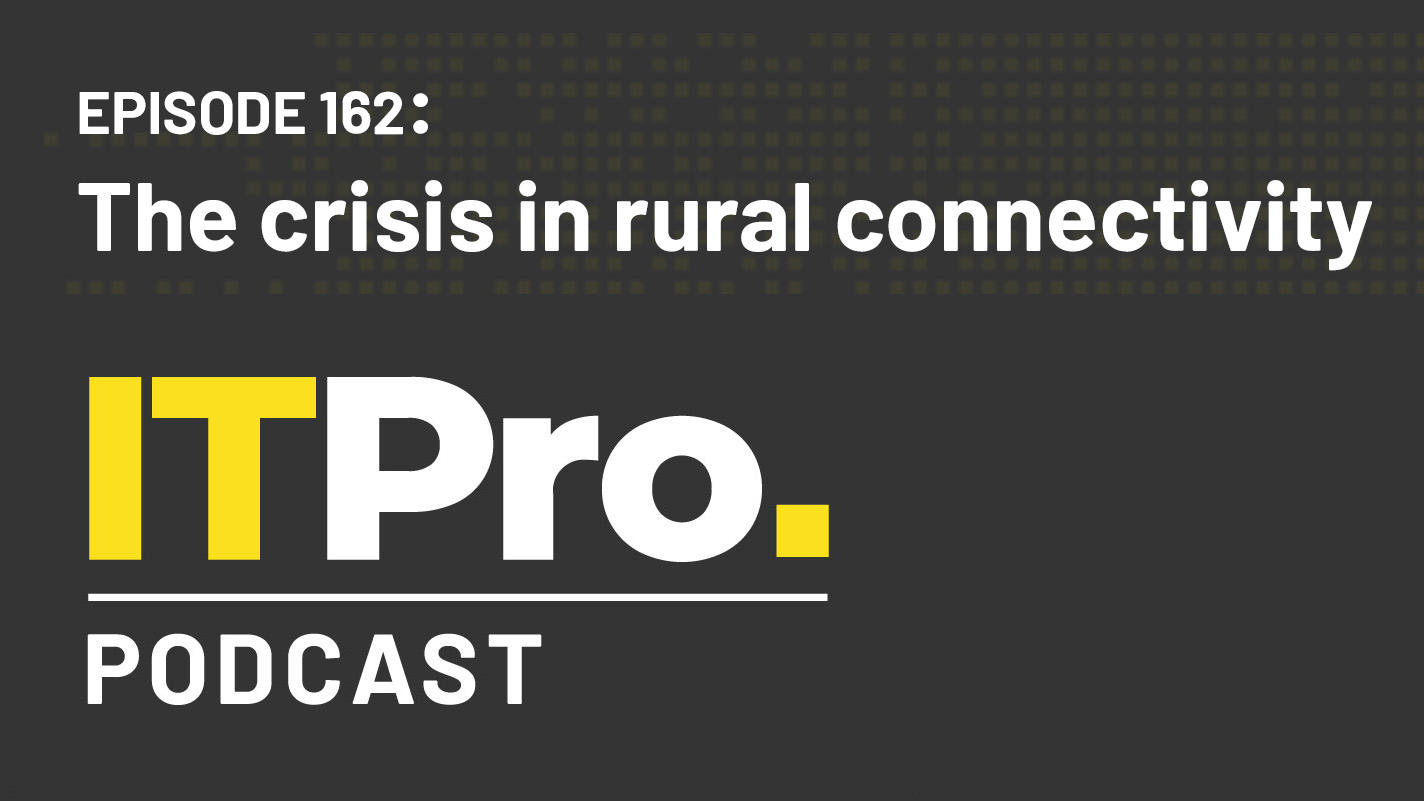Gov's broadband plans do little to address 'rural brain drain', expert warns
Businesses are still unable to compete with urban counterparts, forcing job seekers into the cities and suppressing innovation


Sign up today and you will receive a free copy of our Future Focus 2025 report - the leading guidance on AI, cybersecurity and other IT challenges as per 700+ senior executives
You are now subscribed
Your newsletter sign-up was successful
Rural communities face increased brain drain, poorer business opportunities, and worsening digital exclusion under current government broadband plans, an industry expert has argued.
Poor broadband outreach has undermined the potential of rural businesses, said Dave Happy, Managing Director Telint Ltd and Non-Executive Director Jet Engineering, with many job seekers now being forced to relocate to well-resourced urban centres instead.
Speaking on the IT Pro Podcast, Happy argued the effect of poor connectivity on rural communities is far worse than the stats may suggest.
“The loss to the rural economy of not having this fibre in place is infinitely greater and far more personal than people really understand.
“In terms of gross value added (GVA) I think the stats, if anything, are depressed. I think that the real loss to the rural economy is far more significant than we can report, because one has to remember these are simply economic indices of measurement.”
Happy warned that businesspeople who may wish to establish companies in rural areas are being deterred from doing so due to their poor connectivity. He gave the example of attempting to conduct a simple Teams voice call while driving through Dorset, and having been unable to due to poor connectivity.
The more prospective entrepreneurs and tech workers move to urban areas out of necessity, both in terms of better connectivity and job opportunities, the worse the overall landscape for rural business becomes.
Sign up today and you will receive a free copy of our Future Focus 2025 report - the leading guidance on AI, cybersecurity and other IT challenges as per 700+ senior executives
Current network availability may also be hindering innovation throughout rural England. Leading edge technologies such as 5G mmWave also have a role to play in the agricultural tech sector, according to Happy, including using the standard’s high throughput for analysing individual ears of grain in a field. However, Happy argued that the current government thinking on 5G use cases is too siloed for rural businesses to benefit.
Happy suggested that “pockets of excellence” may be deployed, with research and development hubs designed to help build expertise in a given area spread throughout rural England. These could fill the same role as centres such as the University of Sheffield’s new 6G research facility. He’s currently working on a Skills Development and Training Centre for delivering fibre alongside water at Dorset Innovation Park.
These could help to retain local graduate talent, as well as attract workers from around the country to bolster rural business and improve connectivity in underserved areas.
The government’s target is for 99% of UK premises to have gigabit-capable broadband by 2030. However, in its latest update, Building Digital UK (BDUK) reported that only 36% of rural premises are gigabit-capable and just 33% have full-fibre broadband.
“I actually feel deep concern and support, and pity for BDUK, I think they're trying to do a cracking job. They really are trying to make a difference. And their approach to open access and stuff is really good.
“But on the one hand they're doing great work and on the other hand, it almost feels like Ofcom's given them a kicking, because what we're doing by changing what areas are not covered by what, and when, it doesn't seem to me that it's quite joined up.”
RELATED RESOURCE

ESG: Designing the ideal digital work experience for the next generation of innovators
What users want, why it's critical to give it to them, and how the whole organisation can benefit
Britain’s fibre broadband boom is continuing apace, and alternative network providers (altnets) are leading the charge into rural spaces. Happy highlighted Wessex Internet as one such altnet direct-burying fibre, and noted that these smaller firms may be key in delivering more fibre for rural areas, and delivering on open network opportunities.
The planned 3G sunset, which will see 2G and 3G services shut down across the UK in order for network operators to prioritise 4G and 5G, could also affect rural businesses to a disproportionate extent. Many rural businesses use cellular services for reliable connectivity, and Happy pointed out that “it is not impossible these days that you might be served by some kind of radio solution, or might even be dependent on your 2G or 3G signal”.
He argued that as 3G fills a connectivity niche between 2G and 4G, it’s possible that retiring it could be done with minimal disruption, but that 2G is a more critical network without which rural businesses will suffer.
“2G does give you that excellent coverage,” said Happy.
“The difficulty in terms of spectral efficiency is well known, it's not the most efficient. However, I don't think that they can turn it off easily because the quality of the rest of the infrastructure in a rural area simply won't permit it. Now, I haven't seen that actually stated in a press release by anybody anywhere. But that's the real truth behind it.
“So you can't switch 2G off because it's such an elementary baseline and there's nothing else if you did, it would be a disaster.”
The government has begun trials with Starlink in Snowdonia to test the effectiveness of satellite broadband as a solution for underserved rural areas. However, this will not be able to provide gigabit internet and instead will offer top speeds of 200 Mbit/sec through direct contact with special user terminals.

Rory Bathgate is Features and Multimedia Editor at ITPro, overseeing all in-depth content and case studies. He can also be found co-hosting the ITPro Podcast with Jane McCallion, swapping a keyboard for a microphone to discuss the latest learnings with thought leaders from across the tech sector.
In his free time, Rory enjoys photography, video editing, and good science fiction. After graduating from the University of Kent with a BA in English and American Literature, Rory undertook an MA in Eighteenth-Century Studies at King’s College London. He joined ITPro in 2022 as a graduate, following four years in student journalism. You can contact Rory at rory.bathgate@futurenet.com or on LinkedIn.
-
 ITPro Best of Show NAB 2026 awards now open for entries
ITPro Best of Show NAB 2026 awards now open for entriesThe awards are a fantastic opportunity for companies to stand out at one of the industry's most attended shows
-
 Mistral CEO Arthur Mensch thinks 50% of SaaS solutions could be supplanted by AI
Mistral CEO Arthur Mensch thinks 50% of SaaS solutions could be supplanted by AINews Mensch’s comments come amidst rising concerns about the impact of AI on traditional software
-
 Podcast transcript: The crisis in rural connectivity
Podcast transcript: The crisis in rural connectivityIT Pro Podcast Read the full transcript for this episode of the IT Pro Podcast
-
 The IT Pro Podcast: The crisis in rural connectivity
The IT Pro Podcast: The crisis in rural connectivityITPro Podcast Rural businesses are still being left behind and face shutdowns of 3G and copper without anything to fall back on
-
 UK government to run Starlink trials in Snowdonia, Lake District
UK government to run Starlink trials in Snowdonia, Lake DistrictNews The government has indicated low-Earth orbit satellites could be key to expanding connectivity to UK businesses
-
 Satellite broadband could turbocharge rural business connectivity
Satellite broadband could turbocharge rural business connectivityIn-depth The burgeoning industry is pledging to succeed where fibre has failed, in a much-needed push to connect chronically underserved businesses
-
 Podcast transcript: Can 5G close the digital divide?
Podcast transcript: Can 5G close the digital divide?IT Pro Podcast Read the full transcript for this episode of the IT Pro Podcast
-
 The IT Pro Podcast: Can 5G close the digital divide?
The IT Pro Podcast: Can 5G close the digital divide?IT Pro Podcast Connectivity is essential for modern life - but can 5G help bring it to those without?
-
 BT's 'SoHo' business aims to help SMBs rebuild post-pandemic
BT's 'SoHo' business aims to help SMBs rebuild post-pandemicNews The spin-off will offer broadband packages, free digital skills training and cyber security tools to SMBs and startups
-
 AT&T pledges $2 billion to help bridge the digital divide
AT&T pledges $2 billion to help bridge the digital divideNews Telecoms giant is working with the Emergency Broadband Benefit program